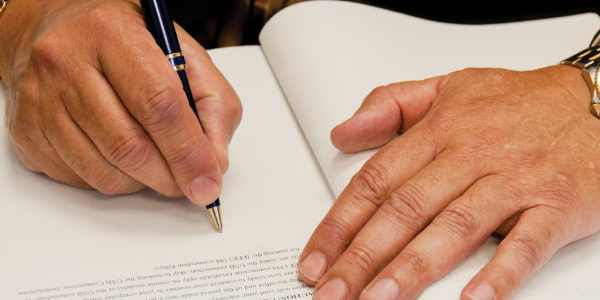Wednesday May 1, 2024
Personal Planner

Ten Reasons to Update Your Estate Plan
You have completed a will and perhaps a revocable living trust. Your durable power of attorney for healthcare and a living will are in place. All of your records are safely in place and carefully organized.
So you now are finished with your estate planning. Or are you? Will there be changes in your circumstances or your family that should lead to a review of your plan? Could some events cause you to need to revise or update the plan?
Yes, there are a number of reasons to consider revising or updating your plan. These include any of the following reasons:
1. New Children, Grandchildren or Other Heirs
Your estate plan almost certainly makes provision for children and other heirs who are living when you pass away. If you have a specific transfer to one child, a new child may receive a smaller than intended inheritance.
For example, John Smith had a $1 million estate and left a $400,000 residence to child A. He then divided the balance of the estate with 1/6 of the balance to child A and 5/6 to child B. If a third child is born, depending upon state law, the child might receive nothing or perhaps would benefit from a portion of the residue. In either case, the uncertainty could lead to estate litigation or to family strife.
If you have a sizeable estate and there are large specific bequests, the arrival of a new heir is a good time to review your plan. One option is to transfer assets to the heirs "then living" when you pass away.
If the estate is $1 million, in some states a child C who is born later would receive 1/3 of the estate. This could dramatically change the benefit for child B and leave her with a reduced inheritance. In addition, child C could be a minor or a very young adult and not be capable of managing his or her property. For several reasons, the arrival of a new heir makes a review of your plan very important.
2. Move to a Different State
If you are married and move to a different state, there may be a change in the laws that affect ownership. Some states are called "common law" property states and some are "community property." If you move from one state to another and change in either direction, it may be important to clarify the ownership of your property as separate property or joint property.
For individuals with moderate to larger estates, there could be significant estate or inheritance taxes. Several states have inheritance taxes that will apply at lower levels than the federal exemption per person. Depending on who among your relatives receives your property, a new state may have a substantial tax.
Finally, many states have specific rules on durable powers of attorney for healthcare, living wills or advance directives. If you acquire permanent legal residence in the state, your doctors will expect that your medical planning documents reflect their state law.
3. Sale or Purchase of a Major Asset
You may have a major real estate asset or a business that is to be transferred to one of your heirs. If that property is sold or substantially increases in value, your entire plan could change. For example, if a property greatly increases in value and there is a large estate tax that is paid out of the residue of your estate, the beneficiary of that specific property could receive a much larger inheritance than you intend. Those children or other heirs who are receiving the residue could find their inheritance greatly reduced by estate tax paid on the asset transferred to the first child.
Alternatively, if the first asset is sold, a child may receive a smaller than intended inheritance. Therefore, a significant sale or purchase is a good time for an estate planning review.
4. Reaching Age 73
The four types of estate property are generally cash and cash equivalents, stocks, real estate and qualified plans. Over the years, your qualified retirement plan may become a large portion of your estate. Your IRA, 401(k) or other qualified plan will require distributions to start on April 1 of the year after you reach age 73.
If you pass away before the entire plan is paid out to you during your retirement years, the balance is transferred to your designated beneficiary. Because retirement plans have grown substantially over the past decade, it's very important to review your beneficiary designations. Many individuals pass away and the plan value is transferred to beneficiaries who have been selected 10, 15, and even 25 years earlier. There could be many reasons why you would want to update that beneficiary designation and age 73 is a logical time to do so.
5. Your Selected Beneficiary is Deceased
In many families there are unmarried brothers or sisters. It is quite common for these individuals to receive an inheritance and to remember the surviving brothers and sisters in their plans. However, even if there are two or three unmarried brothers or sisters, one will inevitably be the survivor and hold most of the assets. If you are remembering a sibling in your plan, there is a substantial possibility he or she will pass away before you do. In that case, it is useful to revise the plan and select a new recipient of that share of your estate.
6. Divorce or Remarriage
Estate plans for single persons are quite different from those of married couples. A single person who transfers assets to a former spouse will not qualify for the unlimited marital deduction. While property settlements are typically handled during the dissolution of marriage proceedings, there are many cases where individuals forget to change beneficiary designations on retirement plans and insurance policies. If an individual later remarries and is survived by their new spouse, there is a high likelihood of litigation between the ex-spouse and the new spouse if the individual forgot to update his or her beneficiary designations. Therefore, this person’s plan and beneficiary designations should always be reviewed in the event of a divorce or remarriage.
7. Substantial Change in Value
If someone’s estate increases or decreases significantly in value, there can be major impact on beneficiaries. For example, Mary has three children, Anne, Bob and Charlie. She leaves a home valued at $300,000 to Anne, a large ranch on desert land valued at $400,000 to Bob and the liquid assets to Charlie, who has the greatest financial need. While Mary is in a nursing home and no longer able to change her will, a utility builds windmills on most of the desert ranchland and pays large annual lease payments. The value of the desert ranch dramatically increases. When Mary passes away, Bob receives the ranch, not worth $400,000 but $8 million. Bob receives an inheritance far greater than Anne or Charlie.
8. Adding a Major Property to a Living Trust
If you have a substantial estate, you may hold your real estate in a living trust. If you invest in real estate or acquire a major new property and transfer that to the living trust, it will be useful to review the plan. In some circumstances, there may be different beneficiaries for the living trust than for your qualified plans and life insurance. The addition of a high value asset to the living trust could increase the benefits for children receiving shares from the trust in comparison to the rest of your heirs.
9. Selected Executor or Trustee Not Available
With a will or a revocable living trust, you may also select a successor executor or trustee. While this usually will handle the situation in which the primary executor or trustee predeceases you, it still is useful to review your plan if one of the designated individuals passes away. You can easily select a new primary executor or trustee with an appropriate backup person.
10. Passage of Time
Estate plans are affected by changes in your asset value, by changes in your family, and potentially by changes in federal or state law. Therefore, it is useful every three to five years for you to sit down with your attorney and review your plan. Given all the potential areas that can change, it is quite likely that you may wish to modify some portion of the plan.
Published December 8, 2023
Previous Articles
Passing Unequal Shares in Your Will










